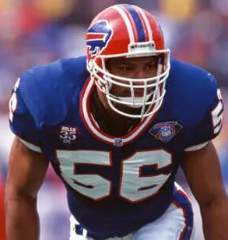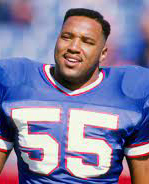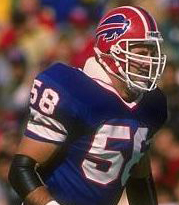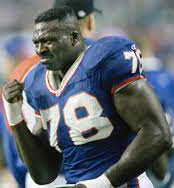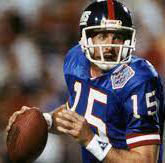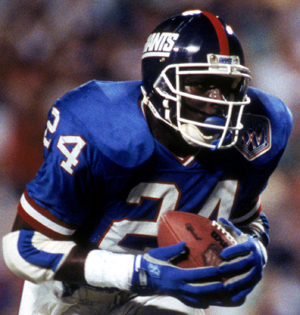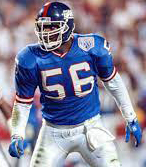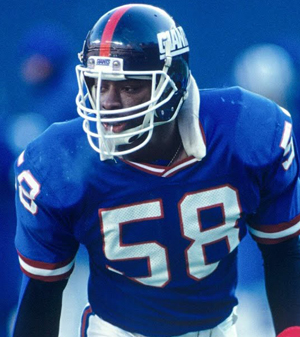|
Super Bowl XXV - Buffalo Bills vs New York Giants: Pregame
Super Bowl XXV in Tampa FL pitted a newcomer to the Big Game with a team that had won its only appearance four years earlier.
The Buffalo Bills enjoyed considerable success as a charter member of the American Football League.
- They won the AFL East and the league championship in both 1964 and 1965. Then they lost the title game in 1966.
- After the merger with the National Football League, the Bills made the playoffs in 1980 and '81 but won only one postseason game under Coach Chuck Knox.
- Marv Levy took over as head coach in 1987 and led the Bills to the conference championship game the following year and into the playoffs again in '89, where they lost to the Cleveland Browns in the first round.
- The Bills finally got over the hump in 1990, clobbering the Los Angeles Raiders in the AFC Championship game 51-3.
As with most Super Bowl teams, the Bills' ascendency was built on talented players executing excellent offensive and defensive systems.
- Levy came to Buffalo from Montreal, where he was the director of football operations for the Alouettes of the Canadian Football League.
- After losing in the playoffs in 1988 and '89, Levy installed a no huddle, fast-paced offense that came to be known as the "K Gun."
- The idea came to him in the fourth quarter of the wildcard game against the Browns in 1989. With the Bills trailing 34-21, Levy told his offensive coordinator, Ted Marchibroda, and his offensive line coach Tom Bresnahan, "We're not going to wait till the end of the game to go to our two-minute drill. Let's go to our two-minute drill right now."
- The move paid off as Levy recalled. "We take it, and we march down the field. Jim Kelly is our quarterback engineering it. We scored, got the ball back, and march down the field with about three minutes to go. We scored again. Now we're down by four." The Bills got the ball back in the last minute and would have won the game if a receiver had held onto a fourth down pass at the edge of the end zone.
- As the coaches walked off the field, Levy turned to Marchibroda and said, "Ted, why don't we make that our offense next year?" Ted replied, "I was just gonna say that to you!" Bresnahan added, "So was I!"
- The 1990 Bills led the NFL in points scored with 428 and were fourth in the AFC and seventh in the league in fewest points allowed. The result was a conference championship and a berth in the Super Bowl.
- You can't score that many points without an excellent ball carrier and proficient wide receivers. The Bills' runner was Thurman Thomas, who gained 1,297y. Andre Reed topped the receivers with 71 catches for 945y with Thomas second (49/532).
The Bills' 3-4 defense boasted four Pro Bowl players.
- Both outside linebackers: Darryl Talley and Cornelius Bennett
- Inside linebacker Shane Conlan
- DE Bruce Smith, whose 19 sacks were 14 more than the next highest Bill, NT Jeff Wright.
After finishing the regular season 13-3 and AFC East champions, the Bills scored 95 points in their two playoff games.
- They outscored the Miami Dolphins 44-34 in the Division round.
- Then the Bills destroyed the Los Angeles Raiders 51-3 in the AFC Championship game.
Bill Parcells' eighth Giants team won their first ten games.
The 1990 Giants were quite different from the '86 Super Bowl champions. Phil Simms recalled.
The '86 team was an explosive one. The '90 team was built in an entirely different way. We tried to suffocate every opponent, and we were extremely successful. Just grinding it to a halt and making it almost unwatchable on TV. It really became a rallying point for our team: How ugly can we make today's game? The way we did it, score early, be aggressive, get on top, then just 'three yards and a cloud of dust.' Another first down by an inch. Three more plays. You look up, the NFL clock can move fast.
RB Ottis Anderson, who came to the Giants in 1986 in time for their first Super Bowl victory, sang a similar tune.
Parcells' 1986 team had all the pieces in place. It was a team that expected to win sooner or later. That team had a name, had a purpose. This 1990 team had no true identity. However, the defense continued to be the pride of the Giants and was the reason we were so successful. It kept us in every game and often totally shut down opponents. ... From the Super Bowl XXI team, we still had some well-known players on defense - Taylor, Banks, Leonard Marshall, Pepper Johnson - but we didn't have any big-name players on offense. We didn't have any leaders. Joe (Pisarcik) was gone; Phil was out with a season-ending injury; (TE Mark) Bavaro was hurting and very quiet.
We had a boring offense. ... It was 2-3 yards and a cloud of dust. Even the receivers hate it. Mark Ingram, Stephen Baker – they complained all the time. They were blocking more than they were running pass routes. We had no deep threat. Defenses would line up eight, nine men on the line, and we'd say, "We know you know we're running, so stop us."
What helped our offense was that we didn't make any mistakes. As a team we made only 14 turnovers in 16 games, which was the fewest in the history of the NFL. It wasn't pride that kept us from fumbling; it was fear. Parcells said, "If you fumble, you're on the sidelines."
An international event January 16 dampened the nation's enthusiasm for the Super Bowl eleven days later.
- President George H. W. Bush launched the first phase of Operation Desert Storm, an air campaign to drive Iraqi forces out of neighboring Kuwait.
- The football game would provide a welcome distraction for a nation dealing with war for the first time in decades.
- "The tensions were high," said Giants LB Carl Banks. "We were experiencing something that we had never experienced before as a nation. In the field of sports, we had never gone through that kind of a military security protocol. Everything we did that week was under the clock of security."
- How fitting that the two teams meeting in the Super Bowl wore colors of red, white, and blue.
The Bills and Giants had played a physical game in December. So another one was expected in Tampa.
- Banks: "The NFC in general was supposed to be more physical. But Buffalo was built like an NFC team and in particular, an NFC East team. They had good, strong guys up front and a good running game and good quarterback. They were physical. We left that game (in December) knowing they were not a typical AFL team).
- The game promised a contrast in styles: The Bills led the NFL in points while the Giants allowed the fewest points.
- In order to win, the G-men had to control the ball to eat up the block and keep Kelly & Company off the field.
So imagine the shock that the Giants defense felt when Belichick presented his game plan to them.
- He wanted less pressure on the quarterback and more on the Buffalo receivers.
- That might allow Thomas, who led the league in yards from scrimmage the last two seasons, to run wild.
- Belichick: "I remember saying that if Thomas rushed 100y, we would probably win. If we just stopped them cold, then it would be all passing, and we really felt they were a pretty good passing team."
- Banks admitted being skeptical. "We were insulted when he first came out and said he wanted Thurman Thomas to get 100y rushing, but then he told us why."
The Bills, favored by nearly a touchdown, swore they were not overconfident.
- Kelly: "I definitely don't think we were overconfident going in. I know I wasn't. ... I thought we were going into that game with a positive attitude, and I'm sure the Giants did too."
- WR James Lofton agreed with his quarterback. "That year, the Giants were the toughest team that we had played. Defensively, they had a lot of standout players and a lot of stars who were still playing really well. We knew it was going to be a tough game."
New York's upset of the 49ers caught the city of Tampa by surprise.
- As the Giants rode busses from the airport to their hotel, they saw billboards plastered with images of San Francisco players.
- When they checked into Hilton Tampa, they saw signs welcoming the 49ers. The hotel management didn't have rooms ready for the Giants because they expected the 49ers.
- The 49ers had been so confident of beating the Giants that they made their hotel reservations, sent their equipment, and made ticket arrangements.
- Both teams noticed the tight security because of the Gulf War. As a result, players mostly stayed in their hotel rooms where they invited family and friends.
The Giants were loose in the locker room before the game.
- Anderson recalled, "There was a lot of laughing and talking. Everybody was hyped because we knew the whole world was watching the game, including our troops."
- Parcells told the team, "We don't need individual heroes. We got here as a team. Let's play as a team. Everybody do what you are capable of doing and don't try to do more. At the end of this game, win or lose, you should be so exhausted because you will hae given your all. If you're not feeling that way, then you didn't do your job."
It was ABC's turn to televise the Super Bowl.
- The Monday Night Football crew provided the play-by-play (Al Michaels) and commentary (Frank Gifford and Dan Dierdorf) with sideline reporters Lynn Swann and Jack Arute.
- Jack Buck and Hank Stram again handled the radio broadcast on CBS.
- Whitney Houston sang a rousing rendition of the National Anthem at a time when U.S. troops were fighting in the Middle East. Her performance is still considered by many the best in Super Bowl history.
- Amid all this, the Air Force staged a "Missing Man" flyover of the stadium to honor the fallen.
|

Marv Levy
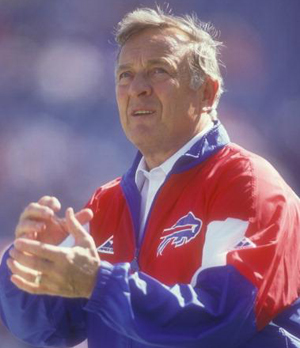
Ted Marchibroda
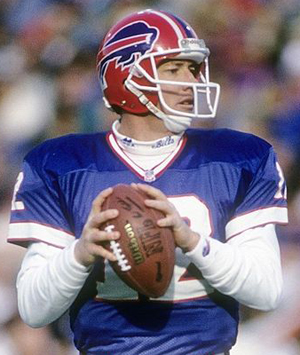
Jim Kelly
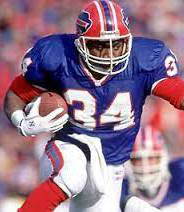
Thurman Thomas
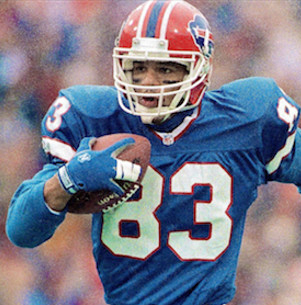
Andre Reed
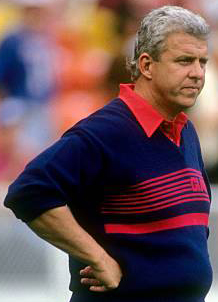
Bill Parcells
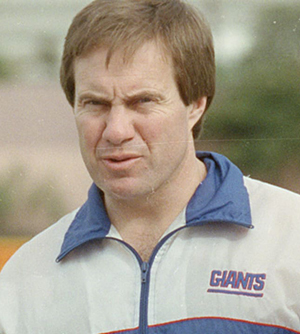
Bill Belichick
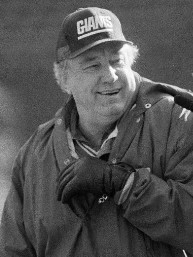
Ron Erhardt
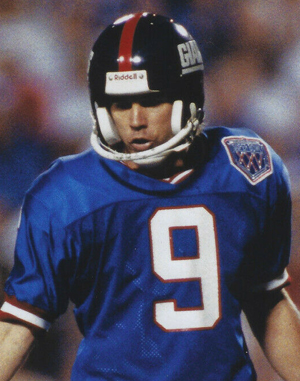
Matt Bahr
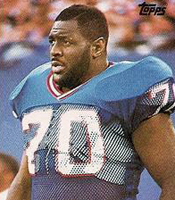
Leonard Marshall
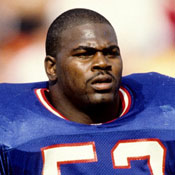
Pepper Johnson
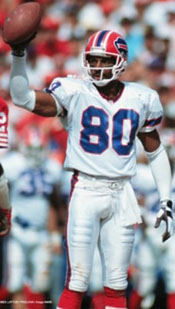
James Lofton
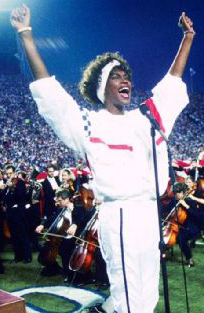
Whitney Houston
|
1990 Buffalo Bills
| # |
Player |
Pos. |
Hgt. |
Wgt. |
College |
Exp. |
| 7 |
Gale Gilbert |
QB |
6-3 |
210 |
California |
4 |
| 10 |
Rick Tuten |
P |
6-2 |
210 |
Florida State |
1 |
| 11 |
Scott Norwood |
K |
6-0 |
205 |
James Madison |
6 |
| 12 |
Jim Kelly |
QB |
6-3 |
220 |
Miami (FL) |
5 |
| 14 |
Frank Reich |
QB |
6-4 |
210 |
Maryland |
6 |
| 22 |
John Hagy |
S |
6-0 |
185 |
Texas |
3 |
| 23 |
Kenneth Davis |
RB |
5-10 |
210 |
TCU |
5 |
| 27 |
Clifford Hicks |
CB |
5-10 |
190 |
Oregon |
4 |
| 30 |
Don Smith |
RB |
5-11 |
200 |
Mississippi State |
4 |
| 31 |
James Williams |
CB |
5-10 |
175 |
Fresno State |
1 |
| 34 |
Thurman Thomas |
RB |
5-10 |
200 |
Oklahoma State |
3 |
| 35 |
Carwell Gardner |
RB |
6-2 |
235 |
Louisville |
1 |
| 37 |
Nate Odomes |
CB |
5-10 |
190 |
Wisconsin |
4 |
| 38 |
Mark Kelso |
FS |
5-11 |
185 |
William & Mary |
5 |
| 41 |
Jamie Mueller |
RB |
6-1 |
225 |
Benedictine |
4 |
| 45 |
Dwight Drane |
S |
6-2 |
205 |
Oklahoma |
5 |
| 46 |
Leonard Smith |
SS |
5-11 |
200 |
McNeese State |
8 |
| 47 |
Kirby Jackson |
CB |
5-10 |
180 |
Mississippi State |
4 |
| 50 |
Ray Bentley |
LB |
6-2 |
235 |
Central Michigan |
5 |
| 51 |
Jim Ritcher |
G |
6-3 |
275 |
North Carolina State |
11 |
| 54 |
Carlton Bailey |
LB |
6-3 |
235 |
North Carolina |
3 |
| 56 |
Darryl Talley |
LB |
6-4 |
235 |
West Virginia |
8 |
| 58 |
Shane Conlan |
LB |
6-3 |
230 |
Penn State |
4 |
| 59 |
Mitch Frerotte |
G |
6-3 |
285 |
Penn State |
2 |
| 63 |
Adam Lingner |
C |
6-4 |
265 |
Illinois |
8 |
| 65 |
John Davis |
G |
6-4 |
310 |
Georgia Tech |
4 |
| 67 |
Kent Hull |
C |
6-5 |
275 |
Mississippi State |
5 |
| 69 |
Will Wolford |
T |
6-5 |
295 |
Vanderbilt |
5 |
| 73 |
Mike Lodish |
DE |
6-3 |
270 |
UCLA |
1 |
| 74 |
Glenn Parker |
G |
6-5 |
305 |
Arizona |
1 |
| 75 |
Howard Ballard |
T |
6-6 |
325 |
Alabama A&M |
3 |
| 78 |
Bruce Smith |
DE |
6-4 |
275 |
Virginia Tech |
6 |
| 80 |
James Lofton |
WR |
6-3 |
195 |
Stanford |
13 |
| 83 |
Andre Reed |
WR |
6-1 |
190 |
Kutztown |
6 |
| 84 |
Keith McKeller |
TE |
6-4 |
245 |
Jacksonville State |
3 |
| 85 |
Al Edwards |
WR |
5-8 |
170 |
Northwestern Louisiana |
1 |
| 87 |
Butch Rolle |
TE |
6-3 |
245 |
Michigan State |
5 |
| 88 |
Pete Metzelaars |
TE |
6-7 |
250 |
Wabash |
9 |
| 89 |
Steve Tasker |
WR |
5-9 |
185 |
Northwestern |
6 |
| 91 |
Jeff Wright |
NT |
6-2 |
270 |
Central Missouri State |
3 |
| 92 |
Gary Baldinger |
NT |
6-3 |
270 |
Wake Forest |
4 |
| 94 |
Mark Pike |
DE |
6-4 |
270 |
Georgia Tech |
4 |
| 96 |
Leon S |
DE |
6-5 |
270 |
Jackson State |
4 |
| 97 |
Cornelius Bennett |
LB |
6-2 |
240 |
Alabama |
4 |
| 99 |
Hal Garner |
LB |
6-4 |
240 |
Utah State |
3 |
|
1990 New York Giants
| # |
Player |
Pos. |
Hgt. |
Wgt. |
College |
Exp. |
| 5 |
Sean Landeta |
P |
6-0 |
200 |
Towson State |
6 |
| 6 |
Matt Cavanaugh |
QB |
6-2 |
210 |
Pittsburgh |
13 |
| 9 |
Matt Bahr |
K |
5-10 |
175 |
Penn State |
13 |
| 15 |
Jeff Hostetler |
QB |
6-3 |
210 |
West Virginia |
7 |
| 21 |
Reyna Thompson |
CB |
6-0 |
195 |
Baylor |
5 |
| 22 |
Lee Rouson |
RB |
6-1 |
220 |
Colorado |
6 |
| 23 |
Perry Williams |
CB |
6-2 |
205 |
North Carolina State |
7 |
| 24 |
Ottis Anderson |
RB |
6-2 |
225 |
Miami |
12 |
| 25 |
Mark Collins |
CB |
5-10 |
190 |
Cal State-Fullerton |
5 |
| 26 |
Dave Duerson |
S |
6-1 |
210 |
Notre Dame |
8 |
| 28 |
Everson Walls |
CB |
6-1 |
195 |
Grambling State |
10 |
| 29 |
Myron Guyton |
FS |
6-1 |
205 |
Eastern Kentucky |
2 |
| 30 |
Dave Meggett |
RB |
5-7 |
180 |
Towson State |
2 |
| 34 |
Lewis Tillman |
RB |
6-0 |
195 |
Jackson State |
2 |
| 43 |
David Whitmore |
CB |
6-0 |
235 |
Stephen F. Austin |
1 |
| 44 |
Maurice Carthon |
RB |
6-1 |
225 |
Arkansas State |
6 |
| 46 |
Roger Brown |
CB |
6-0 |
195 |
Virginia Tech |
1 |
| 47 |
Greg Jackson |
SS |
6-1 |
200 |
LSU |
2 |
| 51 |
Bobby Abrams |
LB |
6-3 |
230 |
Michigan |
1 |
| 52 |
Pepper Johnson |
LB |
6-3 |
250 |
Ohio State |
5 |
| 55 |
Gary Reasons |
LB |
6-4 |
235 |
Northwestern State |
7 |
| 56 |
Lawrence Taylor |
LB |
6-3 |
245 |
North Carolina |
10 |
| 57 |
Lawrence McGrew |
LB |
6-6 |
250 |
USC |
10 |
| 58 |
Carl Banks |
LB |
6-4 |
235 |
Michigan State |
7 |
| 59 |
Brian Williams |
C-G |
6-5 |
300 |
Minnesota |
2 |
| 60 |
Eric Moore |
G |
6-5 |
290 |
Indiana |
3 |
| 61 |
Bob Kratch |
G |
6-3 |
290 |
Iowa |
2 |
| 65 |
Bart Oates |
C |
6-3 |
265 |
Brigham Young |
6 |
| 66 |
William Roberts |
G |
6-5 |
280 |
Ohio State |
6 |
| 70 |
Leonard Marshall |
DT |
6-3 |
285 |
LSU |
8 |
| 72 |
Doug Riesenberg |
T |
6-5 |
275 |
California |
4 |
| 73 |
John Washington |
DE |
6-4 |
275 |
Oklahoma State |
5 |
| 74 |
Erik Howard |
DT |
6-4 |
270 |
Washington State |
5 |
| 76 |
John Elliott |
T |
6-7 |
305 |
Michigan |
3 |
| 77 |
Eric Dorsey |
DE |
6-5 |
280 |
Notre Dame |
5 |
| 80 |
Robert Mrosko |
TE |
6-5 |
270 |
Penn State |
3 |
| 81 |
Stacy Robinson |
WR |
5-11 |
185 |
North Dakota State |
6 |
| 82 |
Mark Ingram |
WR |
5-10 |
190 |
Michigan State |
4 |
| 84 |
Troy Kyles |
WR |
6-0 |
180 |
Howard |
1 |
| 85 |
Stephen Baker |
WR |
5-8 |
160 |
Fresno State |
4 |
| 87 |
Howard Cross |
TE |
6-5 |
245 |
Alabama |
2 |
| 89 |
Mark Bavaro |
TE |
6-4 |
245 |
Notre Dame |
6 |
| 93 |
Mike Fox |
DE |
6-6 |
275 |
West Virginia |
1 |
| 98 |
Johnie Cooks |
LB |
6-4 |
250 |
Mississippi State |
9 |
| 99 |
Steve DeOssie |
LB |
6-2 |
250 |
Boston College |
7 |
|
References: Super Bowl XXV Game Program
The Super Bowl: Celebrating a Quarter-Century of America's Greatest Game (1990)
Super Bowl Chronicles: A Sportswriter Reflects on the First 30 Years of America's Game, Jerry Green (1995)
Super Bowl: The Game of Their Lives, Danny Peary (ed.) (1997)
The Ultimate Super Bowl Book, Bob McGinn (2009)
50 Years, 50 Moments: The Most Unforgettable Plays in Super Bowl History, Jerry Rice and Randy O. Williams (2015)
Super Bowl Gold: 50 Years of the Big Game, Sports Illustrated (2015)
The Super Bowl: The First Fifty Years of America's Greatest Game, David Fischer (2015)
The First 50 Super Bowls: How Football's Championships Were Won, Ed Benkin (2018)
|
|
|
